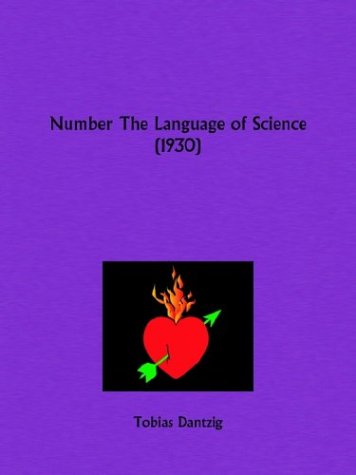Number the Language of Science 1930 - Softcover

"synopsis" may belong to another edition of this title.
"It is the aim of this book to...present the evolution of number as the profoundly human story which it is."
—Tobias Dantzig
"This is beyond doubt the most interesting book on the evolution of mathematics which has ever fallen into my hands. If people know how to treasure the truly good, this book will attain a lasting place in the literature of the world. The evolution of mathematical thought from the earliest times to the latest constructions is presented here with admirable consistency and originality and in a wonderfully lively style."
—Albert Einstein
"Tobias Dantzig's Number: The Language of Science is one of the truly great classics of mathematical exposition, perhaps the most lucid history of the number concept ever written. Its republication should be a cause for celebration by every scientifically minded person, regardless of his or her mathematical background."
—Eli Maor, author of e: The Story of a Number and To Infinity and Beyond
"Tobias Dantzig's Number is a classic. A fascinating account of the evolution of mathematics, it deserves a place on the bookshelf of anyone who is interested in the history of thought."
—Charles Seife, author of Zero and Alpha and Omega
"A classic! Anyone interested in the history of numbers and mathematics should read this book."
—Mario Livio, author of The Golden Ratio
From the rudimentary mathematical abilities of prehistoric man to the counterintuitive and bizarre ideas at the edges of modern math, this masterpiece of science writing tells the story of mathematics through the history of its most central concept: number.
Dantzig succeeds in his aim to reveal a human story, and in making that story accessible to the non-expert. In his friendly and welcoming style, he shows how math developed from basic faculties present in us all, beginning with our "number sense"—the ability to discern that an object has been added to or removed from a small collection of objects without counting. The subsequent evolution of the concept of number is inextricably linked with the history of human culture, as Dantzig demonstrates. He shows how advances in math were spurred by the demands of growing commerce in the ancient world; how the pure speculation of philosophers and religious mystics contributed to our understanding of numbers; how the exchange of ideas between cultures in times of war and imperial conquest fueled advances in knowledge; and, ultimately, how the forces of history combine with human intuition to trigger revolutions in thought.
Sweeping in scope, Number is an open doorway into the world of math. Dantzig explains the foundations of mathematics with ease, and eloquently explores deeper philosophical questions that arise along the way. He describes the properties of all kinds of numbers—integers, primes, irrationals, transcendentals, and more. He explains the significance of zero, and shows that its invention had revolutionary consequences for arithmetic. He shows how the invention of symbols for use in algebra—a radical departure from tradition at the time—ushered in a new era of math; how arithmetic and geometry reflect each other; and how calculus uses infinity to model the continuity of space and time.
With a new afterword, notes section, and bibliography written by math professor and author Joseph Mazur, and a new foreword by mathematician Barry Mazur, the Masterpiece Science edition of Number—which was first published in 1930—is the first update of Dantzig's classic work in over fifty years. It is a story that ranges from the dawn of man to the genius of history's greatest mathematicians, vividly revealing how the pursuit of knowledge transcends the rise and fall of civilizations.
© Copyright Pearson Education. All rights reserved.
Joseph Mazur is Professor of Mathematics at Marlboro College, where he has taught a wide range of classes in all areas of mathematics, its history, and philosophy.
"About this title" may belong to another edition of this title.
- PublisherKessinger Pub Co
- ISBN 10 0766139948
- ISBN 13 9780766139947
- BindingPaperback
- Number of pages336
- Rating
(No Available Copies)
Search Books: Create a WantIf you know the book but cannot find it on AbeBooks, we can automatically search for it on your behalf as new inventory is added. If it is added to AbeBooks by one of our member booksellers, we will notify you!
Create a Want
